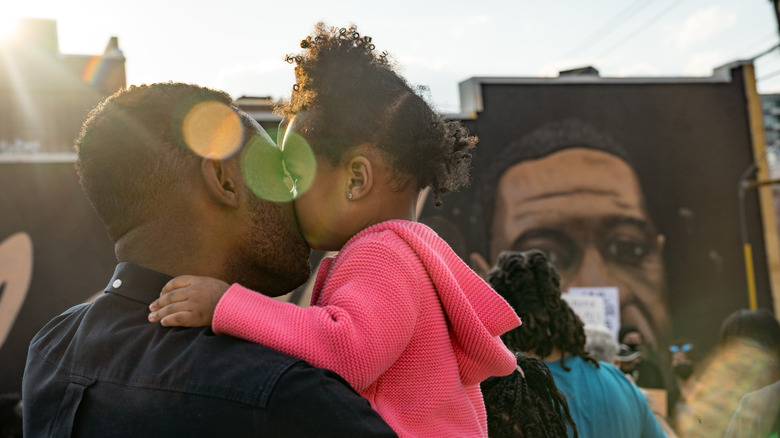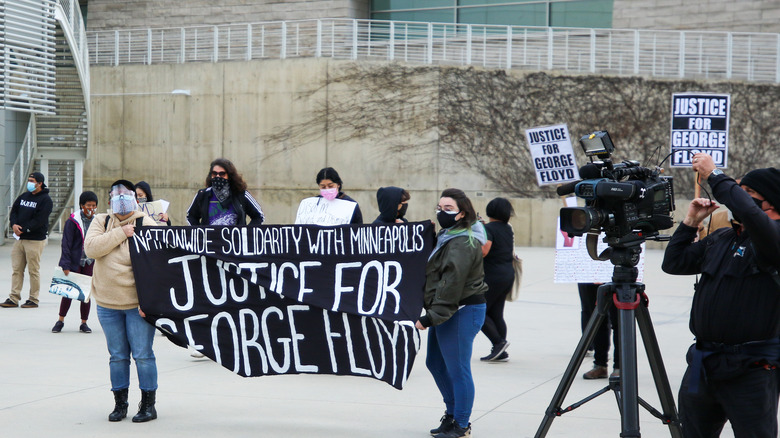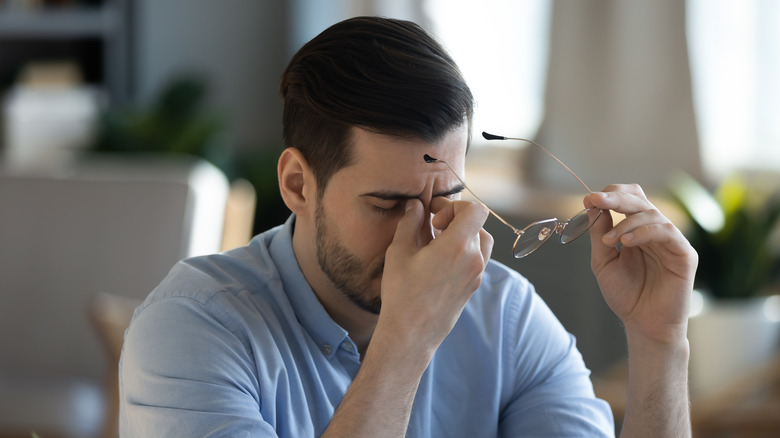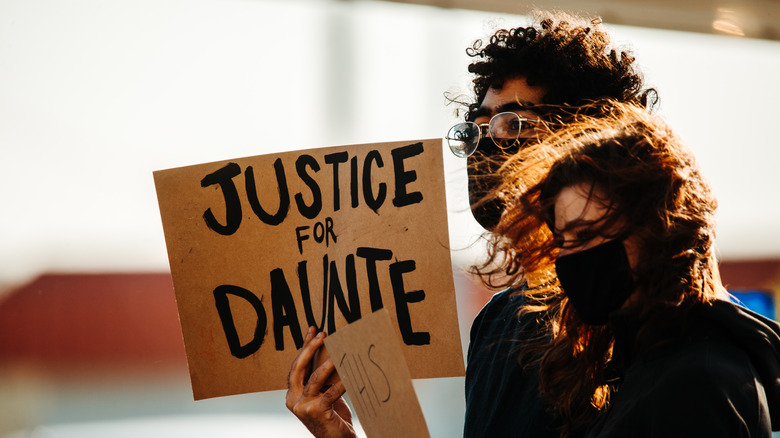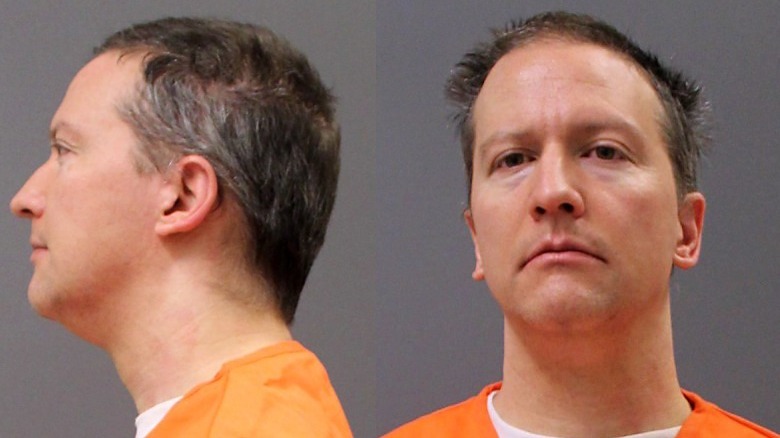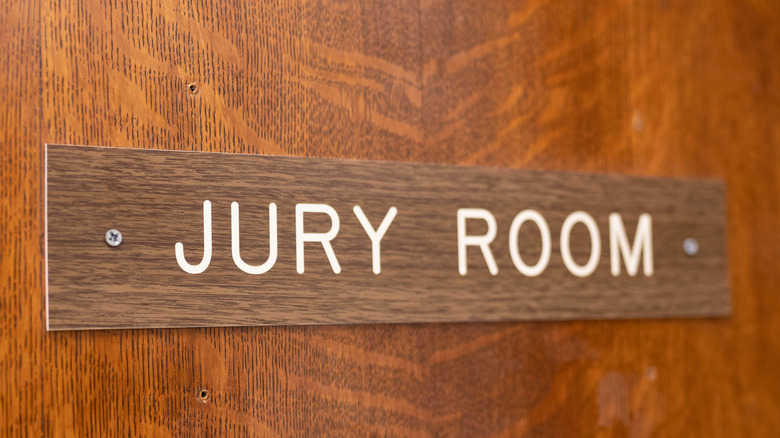What It Was Like Serving On The Derek Chauvin Jury
On May 25, 2020, Minneapolis resident George Floyd died after MPD officer Derek Chauvin knelt on his neck for 9 minutes and 29 seconds. The use of force was widely deemed to be excessive. In fact, Chauvin would go on to be convicted on two counts of murder and one of manslaughter — and the incident would go on to define much of U.S. politics for both that summer and the years following, as thousands of people broke COVID-19 quarantines to protest in the streets. Some protests even turned violent, leading, among other things, to the MPD headquarters being burned to the ground (via Politico).
Given how much of a flashpoint the incident was, it was almost a given that Chauvin's eventual trial for murder and manslaughter would be a flashpoint as well. From March 8, 2021, to April 20, 2021, the whole world seemingly held its breath while a courtroom examined Chauvin's deeds to decide whether he was guilty of the three charges.
With that, 12 people — 15, including the three alternates — had the unenviable position of watching the footage of Floyd's death, over and over again, knowing they had to make a call that would determine the future of race relations in both Minneapolis and the world. It's hard to imagine what that must have been like, but nonetheless, we don't have to, since two of them have reached out to the media about it.
There was a lot of small talk
Under most circumstances, the identities of jury members are public knowledge — it's all part of keeping the legal system as open and transparent as possible, ensuring that the vaunted "jury of peers" is legitimately peers. For certain controversial, high-profile trials, though, exceptions are made out of a desire to preserve both the safety and the impartiality of the jury members.
As possibly the biggest news item of 2021, the Derek Chauvin trial was deemed to be just such a case (via USA Today). "Strong reasons exist to believe that threats to jurors' safety and impartiality exist," wrote Judge Peter A. Cahill. The upshot of this was that every possible measure was taken to ensure that jury members were kept anonymous — not only to the public, but even to each other.
Some measures taken were fairly standard stuff, like ensuring TV cameras were never pointed at the jury box. Some of it, however, got weird and, at times, awkward for jury members. Talking to local NBC affiliate KARE-11, alternate jury member Lisa Christensen commented, "It was hard because we didn't talk about anything pertaining to the jury or the trial at all. ... We didn't identify ourselves amongst each other, so we didn't say our names or occupations or anything about our families. So we had to do small talk like, 'Oh yeah, it's snowing out again today' ... It got kinda hard day after day."
'You're drained at the end of the day'
Being on the jury meant having to watch George Floyd's murder, over and over, each day for more than a month straight — as much as five or six times a day, per The Washington Post. According to juror Brandon Mitchell (interviewed on "CBS This Morning"), the jury didn't feel any particular threats to their safety or pressure to convict, but the stress of the trial alone was enough to put a strain on their mental health. "We were just stressed about the simple fact that every day we had to come in and watch a black man die," he said.
"There were a few days when I was like, 'I don't know how I'm gonna make it in this next day.' Especially me as a black man, and a larger black man — I'm about 6 feet, 4 inches, 250 pounds, and some of the testimony is saying, like, size could be considered — like is it a risk or a threat? Whereas me, I'm a gentle giant, and stuff like that affects me in a way that is weird," Mitchell added.
According to prosecutor Jerry Blackwell, the goal was to win both the hearts and the minds of jurors, which led to an awful lot of highly emotional testimony, including from George Floyd's brother. Talking to KARE-11, Mitchell commented, "The stories he was telling, along with the pictures of them as kids ... it reminded me of me and my siblings, 100%."
There was violence
A little over a month into the trial, the Minneapolis area was rocked by yet another incident of racially tinged violence, when, in Minneapolis suburb Brooklyn Center, white police officer Kimberly Potter pulled over black motorist Daunte Wright for expired tags, and then shot him (she claimed she had reached for her taser but grabbed her gun by mistake). Potter was subsequently arrested and charged with second-degree manslaughter (via NBC News), but not before the incident triggered another round of mass protests, some of which turned violent.
Christensen, who doesn't live far from the Brooklyn Center Police Department headquarters, which became the nexus of the protests, told KARE-11, "When I came home, I could hear the helicopters flying over my house till like one in the morning, I could hear the flashbangs going off. If I stepped outside, I could see the smoke from those smoke grenades going on. One time, the trial ran a little bit late, so I had a hard time getting to my house because all those protesters were blocking the intersections and stuff."
Still, Christensen insists the protests and violence had no influence on the jury's impartiality. "I was aware, but it did not affect me at all," she insisted. Mitchell concurs, telling KARE-11 that the jury was barely aware of the details of the new incident. "We were so focused on the case, and the stress of the trial alone was just so much, it's like, you don't want to get engulfed in more negative news."
Derek Chauvin seemingly went from confident to uncertainty
Both Christensen and Mitchell — so far the only two jury members to speak publicly about their experiences — apparently agree that Chauvin's defense team seemed to have no real case. "The defense never had an 'a-ha' moment," Mitchell told Lou Raguse, via YouTube. "I know that was something I was kinda waiting on, like, well, it's gotta be coming soon, like at some point, they're gonna say, 'Boom,' and it's gonna be like, 'Oh wow, which way are we gonna go, now that they have this damning evidence?' ... and it just never happened."
The decisive witnesses at the trial seemed to all be on the prosecution's side, including expert witness Dr. Martin Tobin, who testified that Floyd died from asphyxiation, rather a fentanyl overdose, as the defense suggested (via NPR). Minneapolis Chief of Police Medaria Arradondo, in a move that was almost unprecedented, took the stand to condemn Chauvin's actions and clearly state that they went against both the MPD's training and its policy (via CNN).
This breaking of the so-called "blue wall of silence" — the unwritten code that usually prevents cops from testifying against other cops (via CNN) — may be why Mitchell and Christensen both felt like they could see Chauvin's countenance fall in real-time as the trial went on. "It seemed like he was pretty confident in those first few weeks," Mitchell said. "As the case got weaker, I could read it on his face."
They didn't see each other face-to-face until deliberations
Since the trial took place during the coronavirus pandemic, everyone involved had been masked the whole time; it wasn't until the jury began deliberations — sequestered at a hotel — that they were finally able to remove their masks.
According to Mitchell, the mask question was used mainly as an icebreaker to get the jury members deliberating and voting. "The first thing we did is we voted on whether or not we wanted to have our masks on," he told CBS This Morning. "So we made that kind of an icebreaker, just to get going." From there, the jury elected a foreman, and then voted their way up the charges — from second-degree manslaughter to third-degree murder to second-degree unintentional murder. According to Mitchell, it wasn't difficult to arrive at the guilty verdicts. "It wasn't like [the handful of skeptical jury members] were on the fence," he told KARE. "They just wanted to do their due diligence and be sure. ... I don't knock them for wanting to take their time on a big decision like this."
The jury reached all three verdicts after 10 hours of deliberation over two days, and afterwards was understandably exhausted. "I probably said something like, 'Phew, let's get a beer,' or something," Mitchell said. "We all were very relieved when we were finished." And — to the point — they were finally at liberty to get to know the people they'd been sitting with for more than a month.
